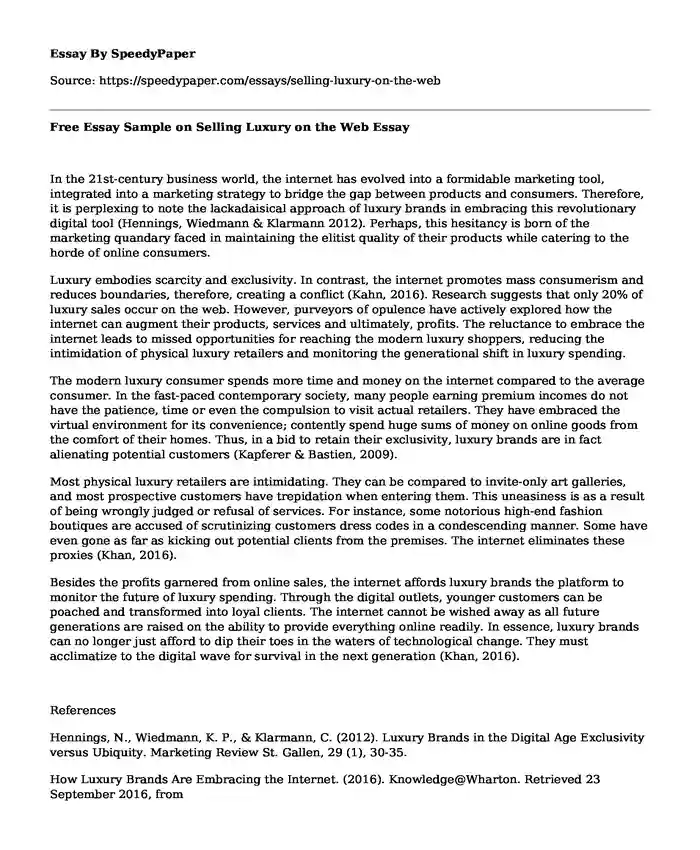In the 21st-century business world, the internet has evolved into a formidable marketing tool, integrated into a marketing strategy to bridge the gap between products and consumers. Therefore, it is perplexing to note the lackadaisical approach of luxury brands in embracing this revolutionary digital tool (Hennings, Wiedmann & Klarmann 2012). Perhaps, this hesitancy is born of the marketing quandary faced in maintaining the elitist quality of their products while catering to the horde of online consumers.
Luxury embodies scarcity and exclusivity. In contrast, the internet promotes mass consumerism and reduces boundaries, therefore, creating a conflict (Kahn, 2016). Research suggests that only 20% of luxury sales occur on the web. However, purveyors of opulence have actively explored how the internet can augment their products, services and ultimately, profits. The reluctance to embrace the internet leads to missed opportunities for reaching the modern luxury shoppers, reducing the intimidation of physical luxury retailers and monitoring the generational shift in luxury spending.
The modern luxury consumer spends more time and money on the internet compared to the average consumer. In the fast-paced contemporary society, many people earning premium incomes do not have the patience, time or even the compulsion to visit actual retailers. They have embraced the virtual environment for its convenience; contently spend huge sums of money on online goods from the comfort of their homes. Thus, in a bid to retain their exclusivity, luxury brands are in fact alienating potential customers (Kapferer & Bastien, 2009).
Most physical luxury retailers are intimidating. They can be compared to invite-only art galleries, and most prospective customers have trepidation when entering them. This uneasiness is as a result of being wrongly judged or refusal of services. For instance, some notorious high-end fashion boutiques are accused of scrutinizing customers dress codes in a condescending manner. Some have even gone as far as kicking out potential clients from the premises. The internet eliminates these proxies (Khan, 2016).
Besides the profits garnered from online sales, the internet affords luxury brands the platform to monitor the future of luxury spending. Through the digital outlets, younger customers can be poached and transformed into loyal clients. The internet cannot be wished away as all future generations are raised on the ability to provide everything online readily. In essence, luxury brands can no longer just afford to dip their toes in the waters of technological change. They must acclimatize to the digital wave for survival in the next generation (Khan, 2016).
References
Hennings, N., Wiedmann, K. P., & Klarmann, C. (2012). Luxury Brands in the Digital Age Exclusivity versus Ubiquity. Marketing Review St. Gallen, 29 (1), 30-35.
How Luxury Brands Are Embracing the Internet. (2016). Knowledge@Wharton. Retrieved 23 September 2016, from http://knowledge.wharton.upenn.edu/article/how-luxury-brands-are-going-digital/
Kapferer, J. N., & Bastien, V. (2009). The Luxury Strategy: Break the Rules of Marketing to Build Luxury Brands. Kogan Page: London, UK.
Khan, Barbara E. (2016). Online Luxury Retailing: Leveraging Digital Opportunities Research, Industry Practice, and Open Questions. Jay H. Baker Retailing Center, The Wharton School. University of Pennsylvania.
Cite this page
Free Essay Sample on Selling Luxury on the Web. (2019, Nov 06). Retrieved from https://speedypaper.com/essays/selling-luxury-on-the-web
Request Removal
If you are the original author of this essay and no longer wish to have it published on the SpeedyPaper website, please click below to request its removal:
- Juvenile Corrections Essay Example
- Free Essay on the Issue: Is Football Too Dangerous as a Sport?
- Analysis of Three Short Stories by Chinua Achebe, Literary Essay Sample
- Free Essay with Statistics on Pressure Ulcers at St. Joseph Hospital
- Essay Sample on Homeland Security - Methodological Approach
- Radiology Equipments Are Safer Now than Before, Free Essay in Medicine
- Essay Example. Functionalism and AI
Popular categories





